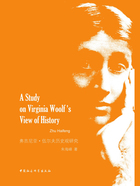
Chapter One Virginia Woolf's View of History and Historiography
Virginia Woolf's position as a historian is less secure than her position as a modernist writer and feminist because her researchers have been much fascinated with her modernist aesthetics and feminism.In fact,besides being a feminist,Virginia Woolf is a modernist writer with historical consciousness.Virginia Woolf's family and education background enabled her to study history at an early age.Her mother Julia Stephen taught her and her sister Vanessa Stephen history and French when they were kids and her father Leslie Stephen,the editor of the Dictionary of National Biography,granted her the freedom to read the books in his library.In her father's library,she read some history books written by historians,such as Gibbon,Macaulay,Carlyle and Walter Scotts.In addition to the family education,Virginia Woolf enrolled in history courses at the Ladies' Department of King's College London from 1987 to 1901,during which she studied English History and Continental European History systematically,taught by John Knox Laughton,a Professor of Modern History (Jones and Snaith 41-42).Virginia Woolf's link to history was also shown from her career as a history teacher at Morley College from 1905 to 1907 for the working men and women,and she reformed the traditional method of history teaching which focused on the“hard dates”of historical events.On the one hand,she required students to take home“a sheet of hard dates”so that they could remember“something solid to cling to.”On the other hand,she added her explanation and imagination when teaching history to make students“feel the flesh&blood”rather than dull and solid historical dates (Quentin Bell,Virginia Woolf: A Biography I 203).Virginia Woolf's view of history and historiography became distinct in her classification of Edwardians and Georgians in Mr.Bennett and Mrs.Brown published in 1924.As Anna Snaith argues in the“Introduction”of her edited The Years,the conventions of realist Edwardians relied on are“not only unreal but illsuited for use by contemporary novelists who were more deeply concerned with personality or character than any previous generation”(Snaith xxi).Virginia Woolf's interest focuses on“the experience of the single individual moving through the mundanities of everyday life caught in a moment of confusion which prompts examination”(Snaith xxiv).It is because of the free flow of the characters' mind in Virginia Woolf's works that history in the memory can“flicker across the landscape of the present consciousness”and break the limit of time and space (Snaith xxiv).Not only does Woolf deal with history as pastness of the present,but she also emphasizes the writer's reconstruction role of the past in the artistic creation,and her insightful view of history and historiography is shown in her diary entries,letters,essays and novels.